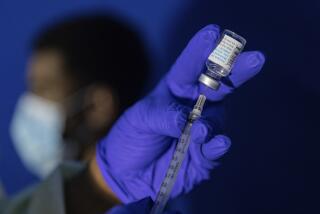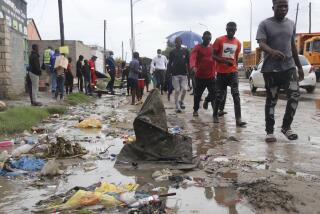After two years of pain and heartbreak, Africa declared free of Ebola
Reporting from Monrovia, Liberia — Marian Bah lost a child and husband to Ebola and was so shunned by her family and community in Monrovia, the Liberian capital, she said, that “I wanted to kill myself.”
Agnes Saybeh has been left alone with the three orphaned children of her sister, who died of the disease, and a child of her own. But there’s no money coming in from her work selling goods on the street.
“I lost seven persons in my family to the Ebola and since I haven’t been myself. It is a burden to take of these children,” said Saybeh, a single mother.
Stephen Kpoto lost his parents and one brother to the disease. Now he’s left with nine children to feed. Kpoto, 31, had to take a break from his college studies to take care of the children.
“See me now, I’m getting gray hair because it is stressful taking care of these children,” he said. “Taking care of these children is a huge task. Right now as we are talking I’m thinking about their school fees.”
By the time West Africa was declared Ebola-free Thursday, the disease had left behind ruined lives, shattered economies and a chorus of echoing questions.
Unlike previous outbreaks in small, contained areas, the disease ravaged the region for more than two years, presenting scientists and health researchers with many questions:
Why did the disease reemerge, after having been apparently quashed? Why were Western patients treated in Western hospitals so much more likely to survive than Africans? Could hundreds, perhaps thousands, of lives have been saved by giving patients a simple malaria drug as part of their treatment? Why do patients suffer racking aftereffects such as aches, pains and headaches months after recovering from the disease? Could the swift spread of the disease have been prevented by focusing more resources on the poorest communities with the highest transmission rates? And could it happen again?
The World Health Organization warned of likely new outbreaks in the three West African countries worst hit by the disease: Liberia, Sierra Leone and Guinea. But Thursday marked 42 days since the last known Liberian patients, the father and brother of a 15-year-old boy who died of Ebola, were discharged from the hospital. Neighboring Sierra Leone was declared free of the virus Nov. 7, and Guinea was declared Ebola-free Dec. 29.
The epidemic that began in December 2013 left 11,315 dead, and probably many more because authorities believe some cases were hidden, and infected nearly 29,000 people. The two-year outbreak accounts for 99% of known cases, with the largest previous outbreak killing 280 people in remote Democratic Republic of Congo (formerly Zaire) in 1976, according to the United Nations.
For survivors such as Bah, Saybeh and Kpoto, the question Ebola left is simple but stark: How to survive.
“It’s true that Ebola is over but the burden Ebola brought on us is not over. To look after these children so they can come up is not a small thing,” Kpoto said. “Really there is a need that people come in and help us.” He said speaking about the bitter memories spoiled his day.
As Bah, 27, told of how she’d been abandoned by her family after her husband died, even though she and her children never got the disease, tears poured down her cheeks.
“My husband really used to help me but today everything is me. The children can be asking me for their father and I do not know what to say. The Ebola has thrown my life back,” she said. She sells goods in the West Point slum where she lives to support her two surviving children.
Ebola devastated families, orphaned children and killed the old and young, weak and strong alike. It left the economies of three West African countries shattered -- costing them an estimated $2.2 billion in lost economic growth, according to the World Bank -- and exposed the deep-seated weaknesses in the nations’ health systems that saw the disease spread rapidly. Rebuilding will take years. The World Bank has provided financing of $1.6 billion for the three countries.
Estimates of the numbers of orphans left in Liberia, Sierra Leone and Guinea range from nearly 10,000 (the World Bank) to more than 16,000 (UNICEF).
Infants, small children and the elderly were especially vulnerable to the disease – but young, strong adults, both men and women, were often the most likely to be infected because they carried the sick to clinics in wheelbarrows and taxis, or cared for them at home.
Governments in West Africa had to persuade their communities to turn away from long-held cultural beliefs: Burials for the dead had to be abandoned for cremations, which were taboo in local culture. Cherished traditions, such as laying hands on very ill people and the dead caused the virus to race through families and to jump borders as people traveled into neighboring countries for funerals.
Perhaps most challenging of all, however, was that Ebola’s symptoms are so similar to other common diseases in the region, such as typhoid fever and malaria, that the sick often delayed seeking treatment, convinced they had another ailment.
The WHO said health surveillance would be crucial in months to come, with new cases likely to emerge. Liberia experienced two such flare-ups after it was declared Ebola-free in May.
In some cases, victims have died of the virus without seeking care or being correctly diagnosed, setting off new chains of transmission. In other cases, people who had been exposed to the virus were not monitored for the full 21-day incubation period.
But health authorities are sometimes at a loss to explain Ebola’s reemergence in communities. The virus is known to remain in the bodies of survivors for months, for example in semen and ocular fluid, and research is underway to determine whether it can be spread through contact with these fluids.
Although the potential and frequency of such flare-ups are expected to decrease over time, major challenges will remain for the countries that were hardest hit.
More than 10,000 people survived the virus, U.N. officials say. Some of them continue to suffer health issues, such as pain and weakness, months after being cured.
WHO Director-General Margaret Chan, who was criticized for the organization’s response to the outbreak in 2014, said in Geneva on Thursday that eliminating the disease had been a major accomplishment.
“Detecting and breaking every chain of transmission has been a monumental achievement,” she said. “So much was needed and so much was accomplished by national authorities, heroic health workers, civil society, local and international organizations and generous partners. But our work is not done, and vigilance is necessary to prevent new outbreaks.”
Special correspondent Rogers reported from Monrovia and Times staff writer Dixon from Johannesburg, South Africa. Times staff writer Alexandra Zavis in Los Angeles contributed to this report.
Follow @RobynDixon_LAT and @alexzavis on Twitter
More to Read
Sign up for Essential California
The most important California stories and recommendations in your inbox every morning.
You may occasionally receive promotional content from the Los Angeles Times.










